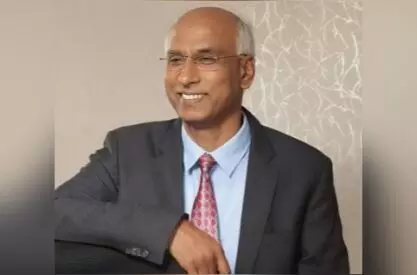AP liquor scam: SIT arrests director of Bharathi Cements, Govindappa Balaji, in Mysuru
This development follows recent SIT searches at Balaji’s residence in Hyderabad
By Sri Lakshmi Muttevi
AP liquor scam: SIT arrests director of Bharathi Cements, Govindappa Balaji, in Mysuru
Amaravati: The Andhra Pradesh Special Investigation Team (SIT) arrested Govindappa Balaji, director of Bharathi Cements, in connection with the alleged Rs 3,200 crore liquor scam that occurred during the tenure of the YSR Congress Party (YSRCP) government. Balaji was apprehended on Tuesday in Mysuru, Karnataka.
This development follows recent SIT searches at Balaji’s residence in Hyderabad. His bail petition is currently under hearing in the Supreme Court.
Balaji is accused of playing a pivotal role in managing financial transactions and facilitating liquor-related kickbacks, reportedly on behalf of YS Jagan Mohan Reddy’s wife, Bharathi.
AP HC denied anticipatory bail
The arrest comes a day after the Andhra Pradesh High Court dismissed the anticipatory bail pleas of Balaji, former IAS officer K Dhanunjaya Reddy (who previously served as secretary to former chief minister Jagan) and Krishna Mohan Reddy, a former Officer on Special Duty (OSD).
Justice T Mallikharjuna Rao denied bail, citing the early stage of the investigation and the gravity of the allegations involving massive financial irregularities.
According to officials, the accused had been evading arrest. The SIT had issued notices to their families and summoned the trio to appear before authorities on May 11.
What was the liquor scam about?
The YSRCP government, after coming to power in 2019, introduced a new liquor policy, claiming it was part of a phased prohibition plan. Under this policy, the State took over nearly 3,500 liquor stores through the Andhra Pradesh State Beverages Corporation Limited (APSBCL).
Liquor shop operating hours were reduced, prices increased, and many well-known brands were replaced with new, lesser-known labels—dubbed ‘Jagan brands’—such as Boom, President Medal, Napoleon and Block Bister.
The APSBCL also controversially switched to cash transactions at all outlets, citing operational challenges with digital payments. Critics claim this move enabled large-scale financial misconduct.
Earlier arrests and interrogations
On April 21, SIT arrested Kasireddy Rajashekar Reddy, the alleged mastermind and former IT adviser to Jagan, at Hyderabad’s Rajiv Gandhi International Airport. Along with him, his personal assistant Dilip Kumar and another accused, Chanaky, were also taken into custody and remanded to judicial custody.
Kasireddy allegedly devised the excise policy with Jagan’s approval to raise funds for the government and party. Though he did not sign a confessional statement, his remand report indicated he orchestrated the collection of nearly Rs 60 crore per month in kickbacks from distillers by promoting select liquor brands while suppressing popular ones. The funds were reportedly funnelled through intermediaries.
SIT has also questioned several other political figures in connection with the case, including former MP V Vijaya Sai Reddy and Rajampet MP PV Midhun Reddy.
ED steps in
Four days ago, the Enforcement Directorate (ED) registered a money laundering case under the Prevention of Money Laundering Act (PMLA) in connection with the liquor scam. The ED has sought case details from SIT officials and the Vijayawada Police Commissioner, including FIRs and related documents. The agency plans to scrutinise the involvement of liquor vendors, agents, and government officials.
Political repercussions and policy change
After regaining power in 2024, the Telugu Desam Party (TDP)-led government reversed the previous liquor policy. Chief Minister N Chandrababu Naidu mandated digital payments at all outlets and introduced measures to make alcohol more affordable to curb illegal smuggling.
TDP leaders accused the YSRCP leadership of enabling the sale of low-quality liquor from distilleries tied to their associates, manipulating sales records, and eliminating digital transactions to facilitate corruption.